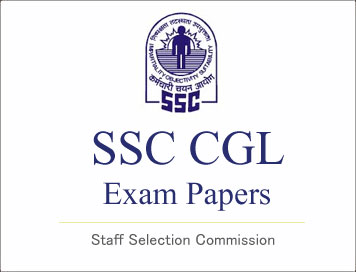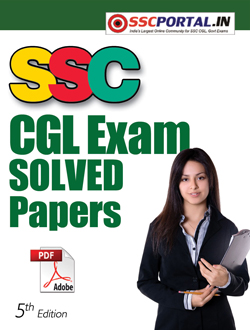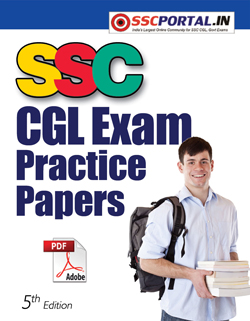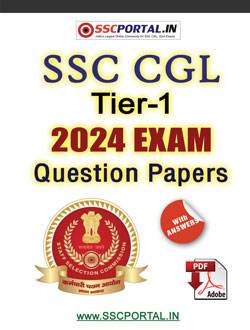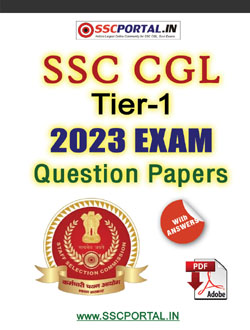NEW! SSC CGL PDF NOTES
SSC CGL (Tier - 1) Previous Year Solved Paper - 2013, 2nd Shift "Reasoning"
SSC CGL (Tier - 1) Previous Year Solved Paper - 2013
Subject: Reasoning
Directions: In question nos. 1 and 2 which of the following interchange of signs would make the given equation correct?
1. 10 + 10 ÷ 10 - 10 × 10 = 10
(a) + and –
(b) + and ÷
(c) + and ×
(d) ÷ and +
2. (8 – 8) + 8 × 32 = 64
(a) ×, +, -
(b) -, ÷, +
(c) +, ÷ , +
(d) +, ÷, ×
3. If ‘R’ stands for ‘–’, ‘A’ stands for ‘+’, ‘B’ stand for ‘÷’ and ‘C’ stand for ‘×’, then what is the value of the given equation? (BODMAS rule not be applicable)
25 A 37 C 2 B 4 R 1 = ?
(a) 32
(b) 35
(c) 30
(d) 27
Directions: In equation nos. 4 to 9, select the related letter/word/number from the given alternatives.
4. Chisel : Sculptor : : Harrow : ?
(a) Gardener
(b) Mason
(c) Blacksmith
(d) Guard
5. Moon : Satellite : : Earth : ?
(a) Sun
(b) Planet
(c) Solar system
(d) Round
6. BJCI : JBIC : : CXDW : ?
(a) JCDU
(b) BCJU
(c) EVFU
(d) XCWD
7. AB : NO : : LM : ?
(a) OL
(b) KP
(c) PK
(d) YZ
8. AG : IO : : EK : ?
(a) LR
(b) MS
(c) PV
(d) SY
9. 25 : 175 : : 32 : ?
(a) 150
(b) 170
(c) 162
(d) 160
Directions: In question nos. 10 to 15, select the one which is different from the other three responses.
10.
(a) Shimla
(b) Darjeeling
(c) Ooty
(d) Agra
11.
(a) Foal
(b) Hen
(c) Lamb
(d) Leveret
12.
(a) BADC
(b) XWZY
(c) VUST
(d) NMPO
13.
(a) DCFG
(b) FEHI
(c) JILM
(d) HGJL
14.
(a) (1, 0)
(b) (2, 3)
(c) (3, 8)
(d) (4) (4, 27)
15.
(a) (96, 24)
(b) (39, 18)
(c) (81, 54)
(d) (82, 64)
16. Which one of the given responses would be a meaningful order of the following words in ascending order?
(1) Accomodation
(2) Perception
(3) Scheme formation
(4) Assimilation
(5) Sensation
(a) 1, 2, 3, 5, 4
(b) 5, 2, 3, 4, 1
(c) 5, 1, 4, 2, 3
(d) 5, 2, 4, 3, 1
17. Which of the given responses would be a meaningful order of the following starting from the inner layer?
(1) Hydrosphere
(2) Atmosphere
(3) Biosphere
(4) Lithosphere
(a) 4, 1, 3, 2
(b) 2, 4, 3, 1
(c) 3, 1, 2, 4
(d) 1, 2, 3, 4
Directions: In question nos. 18 to 21, a series is given, with one term missing. Chose the correct alternative from the given ones that will complete the series.
18. EJO, FKP, GLQ, HMR, ?
(a) ABC
(b) DEF
(c) MNO
(d) INS
19. B O C N D M E ? ?
(a) L F
(b) O P
(c) K L
(d) E F
20. 7, 2 = 59; 5, 3 = 28; 9, 1 = 810; 2, 1 = 13; 5, 4 =?
(a) 19
(b) 9
(c) 20
(d) 239
21. 120, 440, 960, 1680, ?
(a) 2600
(b) 3240
(c) 3040
(d) 2400
Directions: In question nos. 22 to 24, select the missing number from the given responses.
22.
81 64 16
4 9 49
36 16 25
108 96 ?
(a) 230
(b) 140
(c) 120
(d) 410
23.
25 5 5
30 5 6
35 ? 5
(a) 5
(b) 4
(c) 6
(d) 7
24.
24 51 67
2 4 6
5 7 5
53 211 ?
(a) 135
(b) 235
(c) 347
(d) 407
25. G is fatter than H but not as fat as M. Q is also not as fat as M. Who is the most lean person in the group?
(a) Q
(b) H
(c) G
(d) M
26. A man walks 15 metres south. Then turning to his right he walks 15 metres. Then turning to his left, he walks 10 metres. Again turns to his left and walks 15 metres. How far is the from his initial position?
(a) 10 m
(b) 25 m
(c) 15 m
(d) 60 m
27. There are five buses M, N, O, P, Q in the row on a road. Bus M is standing at the front and Q is standing at the back end. Bus N stands between M and O. Bus P stands between O and Q. Which bus is in the middle of the live?
(a) M
(b) P
(c) N
(d) Q
Directions: In question nos. 28 to 30, from the given alternative words, select the words, select the word which cannot be formed using the letters of the given word.
28. DISTANCE
(a) DANCE
(b) STAND
(c) SANE
(d) TEASE
29. RESURRECTIONIST
(a) TOURIST
(b) NOISE
(c) SORCERER
(d) TENDER
30. COMMERCIALISM
(a) CROME
(b) LANCER
(c) MISER
(d) OSCAR
(E-Book) SSC CGL (Tier-1) Exam Question Papers PDF
Click Here to Join SSC CGL (Tier -1) Online Crash Course
Click Here to Buy SSC CGL (Tier -1) Study Kit in Print Copy
31. If DIVINE is coded as AFSFKB, then POWERFUL is coded as
(a) XLHOJVIM
(b) MLTBDCRI
(c) MLWBOCRI
(d) HLTBNCRI
32. If NOTE is written as PQVG, then LIME is written as
(a) VQOG
(b) VKOG
(c) VOKG
(d) VGKO
33. If SMART is coded as UKCPV, the WONDER is coded as
(a) YMPPRT
(b) YMPBGP
(c) YMPBFP
(d) YMBPPG
34. If ‘+’ stands for ‘multiplication’, ‘<’ stand for ‘division’, ‘÷’ stands for ‘subtraction’, ‘–’ stands for ‘addition’ and ‘×’ stands for ‘greater than’ identify which expression is correct
(a) 20 – 4 ÷ 4 + 8 < 2 × 26
(b) 20 × 8 + 15 < 5 ÷ 9 - 8
(c) 20 < 2 + 10 ÷ 4 – 6 × 100
(d) 20 < 5 + 25 ÷ 10 – 2 × 96
35. One day, Nita left home and cycled 10 km southwards, turned right an cycled 5 km and turned right and cycled 10 km and turned left and cycled 10 km. How many kilometers will she have to cycle to reach her home straight?
(a) 10 km
(b) 15 km
(c) 20 km
(d) 25 km
36. Rajat moves from his office to the canteen straight at a distance of 12 metres. Then he turned left and walked for 2 metres. Then he turns left again and walks straight for 12 metres. How far is he from his office?
(a) 10 metres
(b) 12 metres
(c) 8 metres
(d) 2 metres
Directions: In question nos. 37 and 38, two/four statements are given followed by two/four conclusions I, II, III and IV. You have to consider the statements to be true even if they seem to be at variance from commonly known facts. You have to decide which of the given conclusions, if any, follow from the given statements.
37. Statements:
I. All apples are bananas
II. All bananas are sweet.
Conclusions:
I. Some apples are sweet.
II. Some bananas are apples.
(a) Conclusion I follows.
(b) Conclusion II follows.
(c) Either conclusion I or II follows.
(d) Both conclusions I and II follow.
38. Statements:
1. All metals are silver.
2. All silver are diamond.
3. Some diamonds are gold.
4. Some gold are marbles.
Conclusions:
I. Some gold are metals.
II. All metals are diamond.
III. Some silver are marble.
IV. Some gold are silver.
(a) Only conclusion I follows.
(b) Only conclusion II follows.
(c) Only conclusion III follows.
(d) Only conclusion IV follows.
39. Which of the following cubes can be created by folding the given figure?
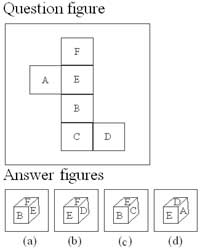
40. Two positions of a dice are given. Which number would be at the top when bottom is 2?
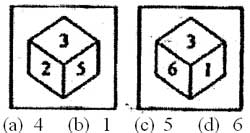
(a) 4
(b) 1
(c) 5
(d) 6
41. Identify the response figure from which the question figures pieces have been cut.
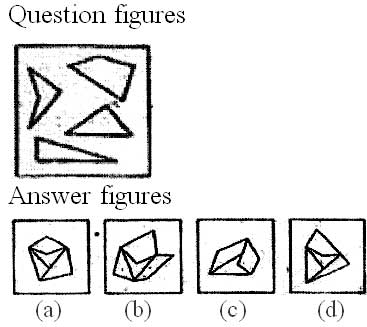
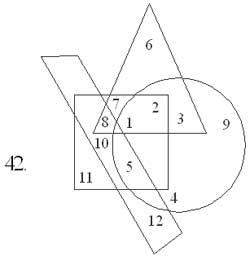
In the above figure, the circle stands for employed, the square stands for social worker, the triangle stands for illiterate and the rectangle stands for truthful. Employed, truthful and illiterate social workers are indicated by which region?
(a) 5
(b) 4
(c) 2
(d) 1
43. Find the missing number.

(a) 37
(b) 45
(c) 47
(d) 57
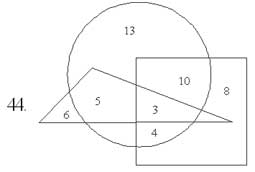
In the above diagram, parallelogram represents women, triangle represent the sub-inspectors of police and circle represents the graduates. Which numbered area represents women graduate sub-inspectors of police?
(a) 5
(b) 3
(c) 8
(d) 13
Directions: In question nos. 45 and 46, which answer figure will complete the pattern in the question figure?
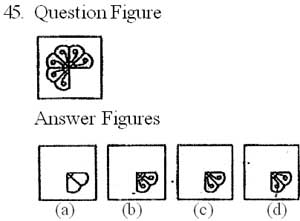
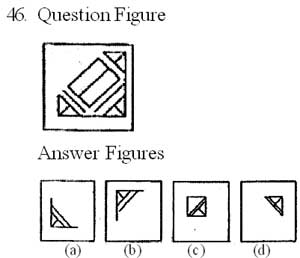
47. From the given answer figures, select the one in which the question figure is hidden embedded.
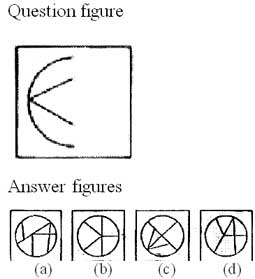
48. A piece of paper is folded and punched as shown below in the question figures. From the given answer figures, indicate how it will appear when opened.
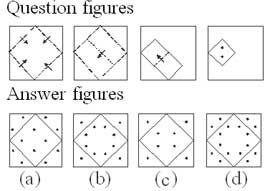
49. Which of the answer figures is exactly the mirror image of the given pattern of numbers when the mirror is held at MN?
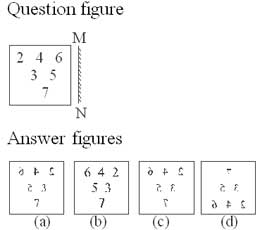
50. A word is represented by only one set of numbers as given in any one of the alternatives. The sets of numbers given in the alternatives are represented by two classes of alphabets as in two matrices given below. The columns and rows of Matrix I are numbered from 0 to 4 and that of Matrix II are numbered from 5 to 9. A letter from these matrices can be represented first by its row and next by its column, e.g., ‘B’ can be represented by 01, 31 etc. and ‘P’ can be represented by 67, 75 etc. Similarly, you have to identify the set for the word ‘CARD’.
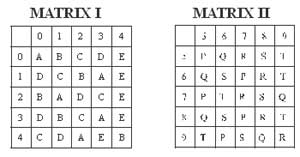
(a) 32, 00, 56, 10
(b) 40, 21, 68, 44
(c) 11, 33, 57, 22
(d) 02, 42, 77, 20
Answer Key
| 1.c | 6.d | 11.b | 16.b | 21.a | 26.b | 31.b | 36.d | 41.d | 46.b |
| 2.d | 7.d | 12.c | 17.a | 22.b | 27.d | 32.b | 37.d | 42.d | 47.c |
| 3.c | 8.b | 13.d | 18.d | 23.d | 28.d | 33.b | 38.b | 43.d | 48.d |
| 4.a | 9.d | 14.b | 19.a | 24.d | 29.d | 34.c | 39.b | 44.b | 49.c |
| 5.b | 10.d | 15.d | 20.a | 25.b | 30.b | 35.b | 40.d | 45.c | 50.c |


